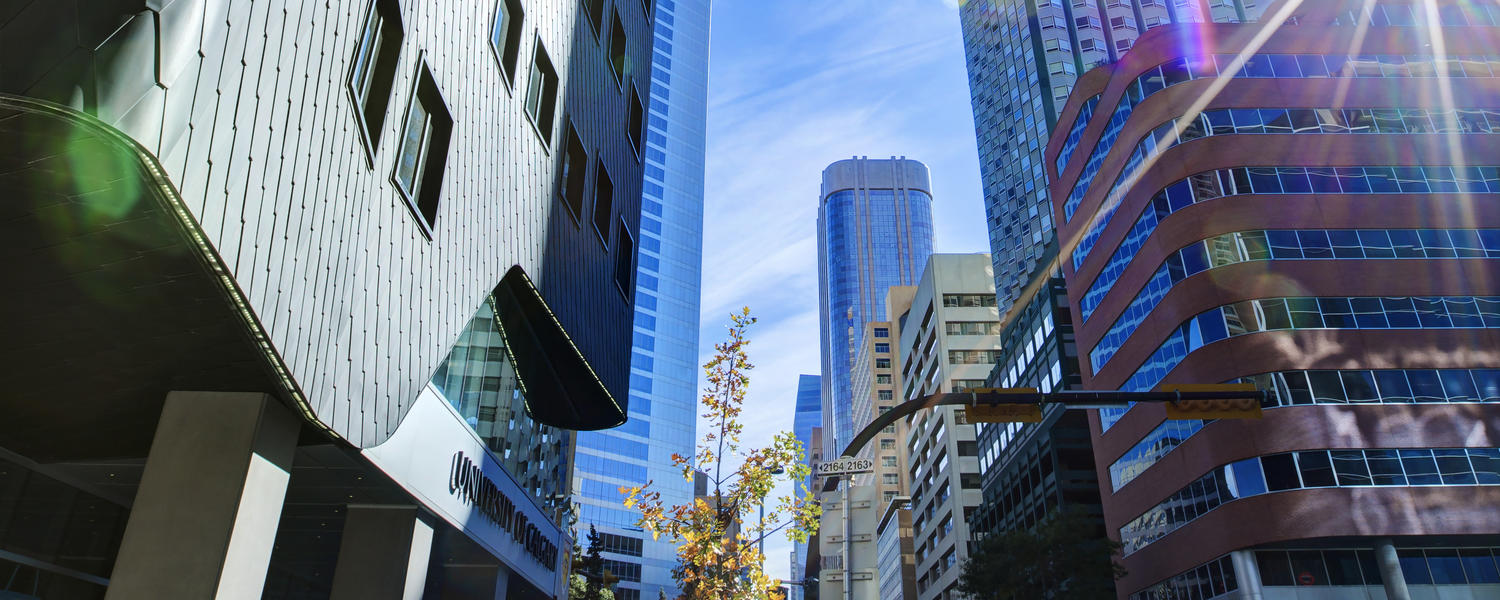Smart Cities Key Initiatives, Research Groups and Centres
Researchers at the University of Calgary have demonstrated expertise in architecture, design, planning, sustainability, transportation and health in the urban environment.

Cities face unprecedented challenges resulting from population growth, migration, changing demographic structure, socio-economic polarization, uneven development and environmental stress. This is resulting in increased pressure on all social and physical infrastructure including housing, health, social services, education, governance, public and private buildings, urban and suburban neighborhoods, landscape/open space systems and urban ecologies, transportation, water, wastewater, communication, energy and other city services and functions.
The social infrastructure of smart cities: creating livable and resilient cities that promote health, social equity, efficiency, connectivity, mobility, and public engagement
Smart cities are socio-technical systems. Technologies must be understood broadly, including not only information and communication technologies (ICTs), transportation technologies, energy systems, etc., but also all tools, devices, and material structures that affect human activities and capacities. Technologies shape social practices just as social practices shape the use and adoption of technologies. As such, we must examine a wide range of social processes and effects implicated in smart cities transitions.
The physical infrastructure of smart cities: creating smart and resilient urban design, transportation systems, energy systems, water systems, and buildings
Improved analysis, performance monitoring, operation management, service delivery, communication, planning, design, and governance are critical to smart city development. Smart cities harness advanced sensing, positioning and information and communication technologies to address urban challenges by simultaneously improving the efficiency of infrastructure, reducing ecological footprints, and actively engaging its citizens.
Researchers at the University of Calgary have demonstrated expertise in architecture, design, planning, sustainability, transportation and health in the urban environment.
A partnership with The City of Calgary that is developing wastewater treatment technologies to remove existing and emerging contaminants as part of improving ecosystem and human health. ACWA brings researchers, practitioners and industry together to solve important problems facing cities everywhere.
Explores environmental and climate-change strategies to incentivize clean transport and healthy cities.
The only Canadian entry in the U.S. Department of Energy’s 2011 Solar Decathlon competition in Washington, D.C, was designed and built by students. The house is net-zero, producing as much electricity as it consumes, and is a hub for solar energy and sustainability research on campus.
This initiative included 12 researchers from the faculties of Arts, Science, EVDS, Schulich School of Engineering and the Haskayne School of Business. The panel presented a list of recommendations on flood/climate- related disaster mitigation and is collaborating to address 10 of the recommendations and help form a national flood risk management- networking group.
Engages graduate students, faculty, professional planners, social workers and community organizations in collaborative projects exploring sustainable communities. These communities build on their assets, value healthy ecosystems, use resources efficiently, and actively seek to retain and enhance a locally based economy.
A 163 m2 black-box test-bed environment used by architecture researchers to assemble full-scale mock-ups of architectural spaces and building components. It is equipped with human factors observational equipment that assesses the acceptability and functionality of the mock-ups. Contact the School of Architecture, Planning and Landscape.
A group of full-time and adjunct faculty members with varying research backgrounds and scientific interests. The HPL objective is to be a leader in both basic and applied research relating to human neuro-musculo-skeletal health and well-being, from birth to advanced age. The research is interdisciplinary and members are focused on the common goal of wellness across the life span.
A multi-university international consortium that provides overall leadership in research, education, planning, design and implementation for mitigation of the impact of natural disasters and infrastructure renewal and reconstruction projects in tsunami-affected or underdeveloped regions.
This interdisciplinary research group explores design, its allied disciplines engineering and production, as well as computer science, material science, mathematics and biology. LID uses algorithmic thinking, biomimicry, computation, digital fabrication, material exploration, and/or performance analyses to discover and create processes, techniques, and products that optimize building performance.
A community-based research platform in EVDS in which researchers, graduate students, industry and community partners help design Calgary’s future. The research is organized into four criteria that define a great city: resiliency, health, vibrance, and equity.
A research group where interdisciplinary work focuses on improving health-care systems and preventing chronic disease. Researchers work on projects such as injury prevention in sport, national food and vaccine policies, government decisions affecting drug prices, and developing tools to care for patients from hospitals to community health providers working with people in their homes. Institute members include researchers from a number of faculties, Alberta Health Services and The City of Calgary.
Investigates and enhances the impact of technology on performance and learning. The lab liaises with organizations and individuals on and off campus to promote human performance and learning technology and works with industry to develop and disseminate technology-based research and resources.
Researchers in this facility, based in the Schulich School of Engineering, collect and analyze live traffic video and information from sensors along Deerfoot Trail to find ways to increase road safety, ease congestion and develop new solutions for traffic issues in Alberta.
This partnership between The City of Calgary and the University of Calgary matches issues identified by the city with researchers who have the expertise to address these issues.
This group in EVDS works with other research groups on campus and with community associations, small municipalities and with The City of Calgary through the Urban Alliance. It focuses on complex issues regarding urban planning, design and development that involve a strong applied research component.
A broad interdisciplinary group of urban scholars associated with the Urban Studies Program, housed in the Department of Geography. The group fosters a variety of research collaborations, from the local to the global, and organizes speaker series and other forms of intellectual exchange.